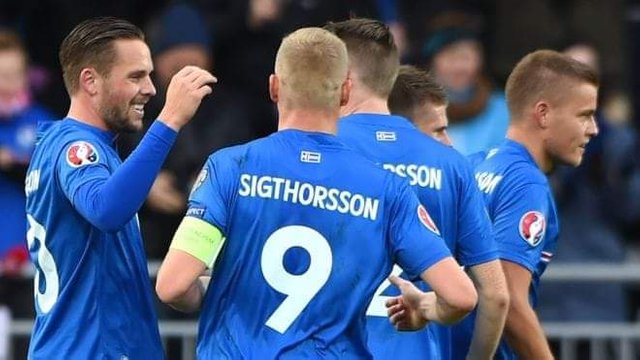I wrote this exactly 2 years ago today and it's even more relevant today.
ICELAND- THE TRADITION OF NAMING AND WHY ALL MALE NAMES END WITH "SON"!
I have received a lot of calls, tags and tweets regarding the peculiarity of the names of Iceland's National Team Players at the Euros and World Cup.
Many asking why almost all names on their team sheet ends with "son". It was intriguing, and I got fascinated by them too. But for the benefit of you all, this is what I gathered after little research ;
Iceland has very strict laws regarding naming of new borns.
The names proposed by parents at birth of their babies must abide by Icelandic pronunciation and grammatical rules.
Remember this is a nation of a little over 330,000 population and one of the few that has been able to hold on to the strict Scandinavian culture on naming.
The country has distinct alphabets and as such, parents are to ensure that names of newly born babies "does not conflict with the linguistic structure of the country".
Simply put, if a new child's name has an alphabet that is not recognised in the linguistic structure of Iceland, the name will be outrightly rejected. When choosing a name, the parents have to stick to a list of legally accepted names first and then middle names.
Currently there are about 1,712 male names and 1,853 female given names on the list.
Couples are to send a request to the Icelandic Naming Committee before being allowed to name their child.
The criterion for acceptance of names is whether or not they can be incorporated into the Icelandic language. If a child's name falls outside the list, he or she will simply be refereed to as a (boy) or (girl) on all documents until parents agree to change name that suits the list.
For instance, the name “Pedro” was rejected recently because no Icelandic name ends with an “O”.
Female names such as “Carolina”, “Christa” and “Balthazar” are not legally accepted as well because the alphabet of the Icelandic language doesn't have the letters “C” or “Z”.
Also, contrary to common practice across the World, and especially in Ghanaian tradition, where parents can name their children depending on situations or any animal or objects, as in Abebrese (sufferer), Adiyiah (The griever), Tulasi (Gun in Hand), Kumdordzi (Death Path), Avugla (Jaw of Dog), Balima (Beggar) etc, such names are highly abominable in Iceland.
According to the Icelandic naming laws, another condition for the approval of a new name is that the name shouldn't be an embarrassment to the child, even if the name is in the list of the accepted Icelandic list. Names such as “Satanía” (Satan), Ljótur (“Ugly”) and “Lofthæna” (“Bad Hair”), for example, were rejected in the past because they might become an embarrassment and social handicap for their bearers in future.
So WHY THE "SON"?
First of all, Icelanders don't have family names.
Secondly, one cannot take up the spouse's last name upon marriage. Again, when naming a child, one has to stick to a limited list of names in the Iceland naming register.
The purpose of this seemingly strict naming policy is to protect Iceland's cultural heritage.
The last name of a male Icelanders therefore usually ends in the suffix -son (“son”) and that of female Icelanders in -dóttir (“daughter”). The (“son”) means (Son of),and (dóttir) means daughter of.
For example, Iceland's current president is Ólafur Ragnar Grímsson, his first name is Ólafur Ragnar and his father's first name was Grímur.
Ólafur's daughters are thus Guðrún Tinna Ólafsdóttir and Svanhildur Dalla Ólafsdóttir.
So for instance, in the the name of Swansea star Gylfi Sigurðsson, his first name is Gylfi, his father's name is Sigurður and he's the son of his father so (Sigurðsson). Such is done to keep the family lineage and national customs.
So if you are in Iceland, and your name is Brako, and your sons first name is Kofi, to keep your family name and save yourself of the stress, your sons surname is simply (Brakosson).
Credit: Saddick Adams Obama